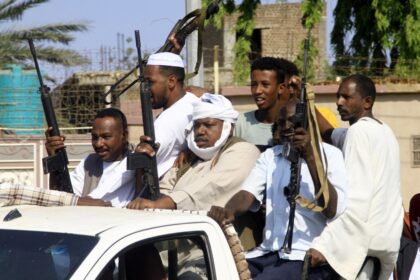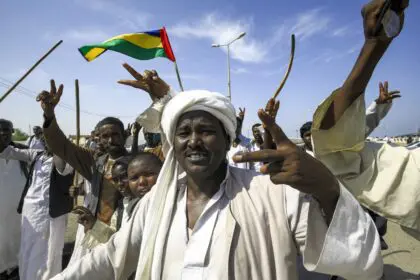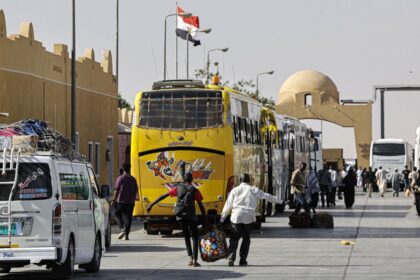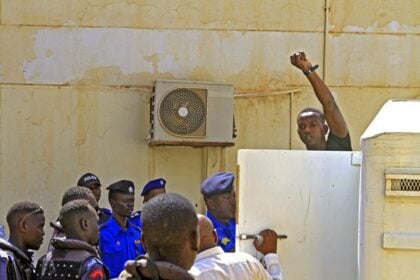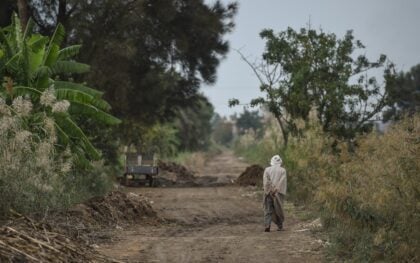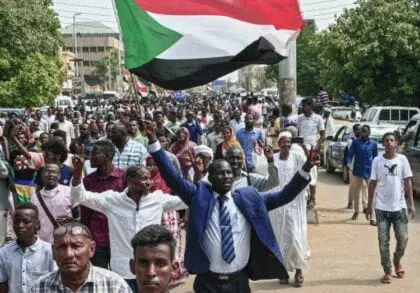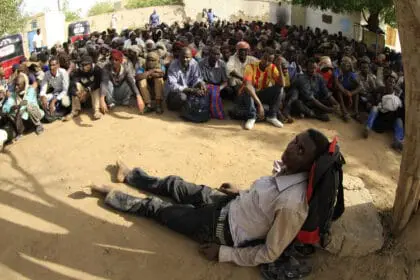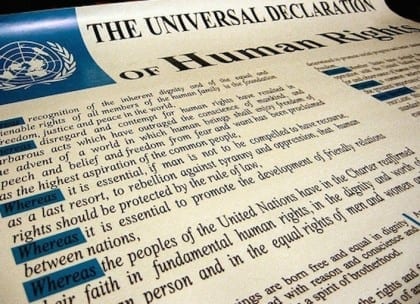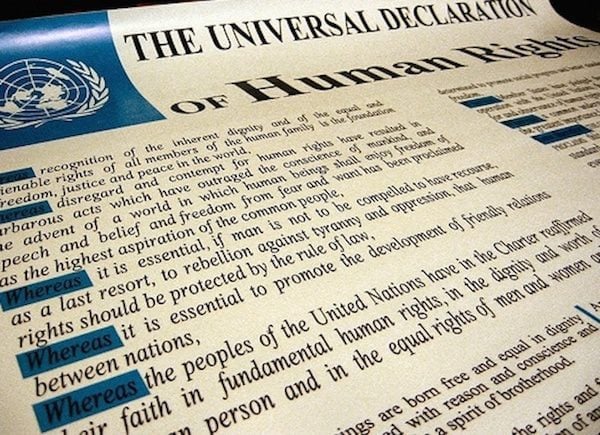
Introduction
The concept of human rights has become a well-known and widely accepted term to use. Varying interpretations are possible, with differences usually being based on cultural background. Nonetheless, most of these understandings consciously or subconsciously include the basic rights outlined in the United Nations’ Universal Declaration of Human Rights.
The United Nations General Assembly (GA) adopted the Universal Declaration of Human Rights on December 10th, 1948. It was written in the aftermath of World War II, “… as a common standard of achievement for all peoples and all nations, to the end that every individual and every organ of society, keeping this Declaration constantly in mind…” Thus, it was truly meant to be universal, to protect citizens from any violation the world had recently experienced, as outlined in the Preamble and 30 Articles.
As such, it includes articles on the right to life in dignity; liberty and security; freedom of movement; right to nationality and education; just treatment of human beings and respect; as well as freedom of expressions and opinions, from torture or inhumane treatment, as well as economic, social and cultural rights.
International Human Rights Law
The Declaration is not legally binding but is the basis of international human rights law. Two binding UN covenants were formed due to the UDHR; the International Covenant on Civil and Political Rights and the International Covenant on Economic, Social, and Cultural Rights. Combined, these three documents are often referred to as the “International Bill of Human Rights.”
Over the years, other conventions have been written to expand on and add to this fundament, focusing on a variety of topics such as refugees (1951 and 1967), discrimination of women (‘CEDAW,’ 1979) and disabled persons (2008), against torture (1987), protection of migrant workers (1990), and against racial discrimination (1969) to name a few.
Additionally, the International Labour Organization has compiled a large number of conventions specifically related to the workforce and labor standards, of which 8 are considered ‘fundamental conventions’ and relate to freedom of association (1948, C087), collective bargaining (1949, C098), forced labor (1930, C029 and 1957, C105), minimum age (1973, C138), child labor (1999, C182), equal remuneration (1951, C100), equal opportunity and treatment (C111).
Geneva Conventions
The Geneva Conventions are a revision of previously constructed conventions, adjusted after WWII, and specifically, focus on treating persons in times of war. It consists of four Conventions and three additional protocols. The International Committee of the Red Cross (ICRC) explains that the Conventions “aims at ensuring that, even in the midst of hostilities, the dignity of the human person, universally acknowledged in principle, shall be respected.”
During a series of expert meetings, congregations by Red Cross agencies, and a confluence of government representatives over time, the articles were revised until a draft was represented at The Diplomatic Conference for the Establishment of International Conventions the Protection of Victims of War in 1949. The Final Act was signed by fifty-nine nations, some of which no longer exist, and has attained more signatories.
The Cairo Declaration on Human Rights in Islam (CDHRI) was compiled by the Organisation of Islamic Cooperation (OIC) in 1990, during the 19th Islamic Conference of Foreign Ministers in Cairo, and has 57 signatories. This Declaration holds similar – if not identical – principles as the UDHR, but notably included articles related to ‘jus in bello’ – acceptable wartime conduct, similar to the Geneva Conventions. The CDHRI also addresses equality between women and men, rights of the child, freedom, right to medical care, right to self-determination. Most notably, this 25 Article document clearly lists the Sharia as a reference point, including punishment. The CDHRI has been adopted by 45 countries, out of the total 57 members of the OIC.
Conventions Signed By Sudan
Sudan signed the Conventions on 23 September 1957, the Additional Protocol I (Protection of Victims of International Armed Conflicts) on March 7, 2006, and Additional Protocol II (Protection of Victims of Non-International Armed Conflicts) on July 13, 2006. Moreover, Sudan became a signatory to the Convention for the Rights of the Child (CRC) on 3 August 1990 and the Optional Protocol to the CRC on 26 July 2005.
Sudan has been a member of the OIC since 1969 and ratified all but one of the fundamental ILO conventions, namely that related to freedom of association (C087).
Refugees
The Convention Relating to the Status of Refugees is based on Article 14 of the UDHR and recognizes refugees’ right to asylum and protection. It was approved during the General Assembly meeting of December 14, 1950, and came into force on April 22, 1954. However, the original Convention limited its scope to refugees fleeing before 1 January 1951. As such, an additional protocol was compiled in 1967, removing these limitations.
On February 22, 1974, Sudan confirmed its accession to the Convention and Protocol. Through “accession,” a state accepts the offer or the opportunity to become a party to a treaty, which has already been negotiated and signed by other states. It has the same legal effect as ratification. It did hold reservations to article 26, however, about freedom of movement.
Women
The Convention on the Elimination of All Forms of Discrimination against Women – also called CEDAW, was approved during the General Assembly Session on 18 December 1979 and entered into force on 3 September 1981. Sudan is not a party to CEDAW.
Persons with Disabilities
The Convention on the Rights of Persons with Disabilities was approved during the General Assembly session on December 13, 2006, and came into force on May 3, 2008. Simultaneously, the Optional Protocol was approved, giving the Committee on the Rights of Persons with Disabilities (CRPD) competence to examine individual complaints concerning alleged violations by States parties to the Protocol. The CRPD is the body of independent experts that monitors the implementation of the Convention. Sudan signed the Convention on March 30, 2007, and ratified it on April 24, 2009. It also acceded to the Optional Protocol on April 24, 2009.
Torture
The Convention against Torture and Other Cruel, Inhuman, or Degrading Treatment or Punishment, also referred to as just the Convention against Torture, was adopted during the General Assembly session on December 10, 1984. On June 26, 1987, it was registered and thereby came into force. Its implementation is monitored by the Committee Against Torture(CAT), composed of ten individuals of various nationalities. All signatory states are obliged to send regular reports to the CAT, based on which recommendations are made. Sudan signed the Convention on June 4, 1986, without reservations, but no further action has been taken.
Migrant Workers
The International Convention on the Protection of the Rights of All Migrant Workers and Members of their Families was approved by the General Assembly on December 18, 1990, and entered into force on July 1, 2003. Sudan is not a party to the Convention.
Racial Discrimination
The Convention on the Elimination of All Forms of Racial Discrimination was approved by the General Assembly and accordingly opened for signature on March 7, 1966. It entered into force on January 4, 1969. Despite the obvious, as stated in the Convention title, it aims to obliterate hate speech and promote understanding. Implementation of the articles is monitored by the Committee on the Elimination of Racial Discrimination, to which each signatory submits bi-annual reports. It is also responsible for handling inter-state and individual complaints related to non-conformity to the Convention’s provisions, as prescribed in Article 14.
Sudan acceded to the Convention on March 21, 1977, with no reservations.
Human Rights in Sudan
The human rights situation in Sudan has deteriorated since 1989. Serious violations of international humanitarian law and international human rights law have occurred.
In Darfur, the authorities failed to protect people from violent clashes between communities, especially between African farmers and Arab camel- and cattle-herders.
Sudanese forces continue to attack the villages of Darfurian African tribes suspected of support for rebel groups. The conflict has displaced more than 500,000 people. The Janjaweed, an Arab tribes militia armed by the government, have committed numerous atrocities against African Darfurians, killing thousands of civilians, burning villages, and looting properties. Most of the Janjaweed were later incorporated into the national army under Borders Guards and Rapid Support Forces titles.
Continuing insecurity has undermined the United Nations and African Union Mission’s attempts in Darfur (UNAMID) to pacify the region.
In South Kordofan and the Blue Nile, indiscriminate shelling by Sudanese government troops and clashes with rebels prevented humanitarian aid from reaching thousands of displaced people in these states, forcing more than 225,000 people to flee to refugee camps in the Republic of South Sudan and Ethiopia.
Sudanese security forces continued to arrest and detain activists and members of opposition parties, controlled the media, restricted civil society’s work, and harassed associations that receive foreign funding.
In September 2014, protests broke out in various parts of Sudan to rise in the prices of fuel and other essential commodities. Sudanese forces responded by killing at least 175 demonstrators and detaining hundreds of protesters, opposition members, and activists.
The International Criminal Court initially indicted President al-Bashir on charges of genocide and crimes against Darfur’s humanity in 2009. It charged five other officials with crimes against humanity and war crimes in Darfur. A second warrant for the arrest of President al Bashir was published in July 2010. The government did not, however, heed these summonses.
The National Security Act (NSA) of 2010 and many other laws contradict basic human rights principles. For instance, the NSA renewed the extensive powers of the National Security Agencies to arrest and detain people for up to four and a half months without judicial oversight and to search and seize. The NSA law enables security agents to commit human rights violations such as torture and other ill-treatment and extract “confessions” under duress. The 2010 NSA Act also maintains the immunity of National Intelligence and Security Service agents from prosecution and disciplinary action for all acts committed in their work and creates a climate of impunity. The most recent amendment of the constitution in 2015 extended the National Security Organizations mandate from collecting and analyzing security information to forming and maintaining combat forces similar to the army.
Latest Articles
Below are the latest articles by acclaimed journalists and academics concerning the topic ‘Human Rights’ and ‘Sudan’. These articles are posted in this country file or elsewhere on our website:



